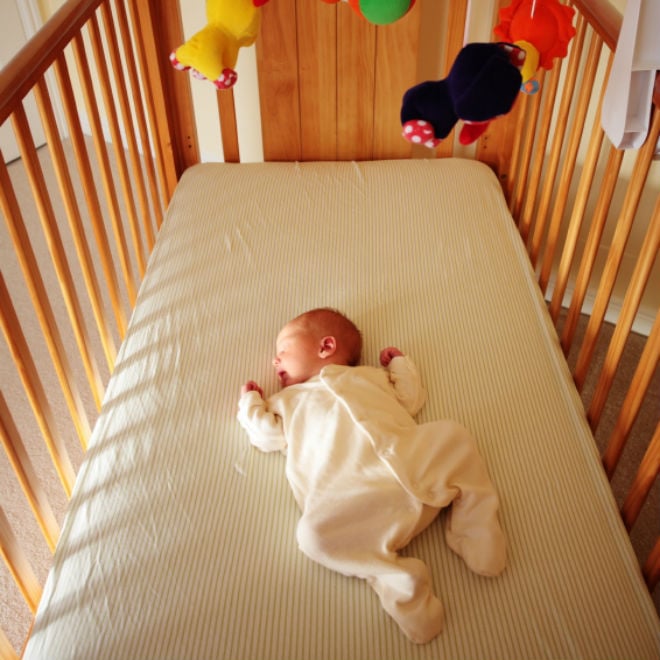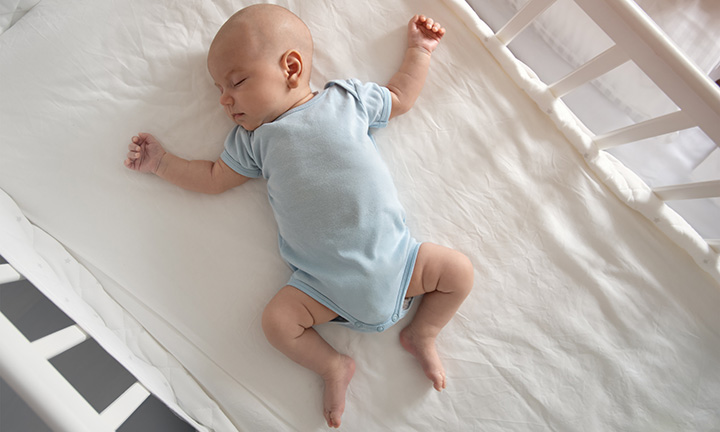How to Help Your Newborn Sleeping in Crib Right Away?
It is generally recommended that newborns sleep in a crib right away. This is because cribs are designed to be safe sleeping spaces for infants, and they provide a firm surface that can help reduce the risk of Sudden Infant Death Syndrome (SIDS).
Sleeping in a crib allows parents to more easily monitor their baby’s breathing and movements.
When you have a new baby, it can be tempting to want to keep them close by your bed. But is it really the best idea for your newborn to sleep in their own crib right away?
Here are some things to consider:
1. It’s important for your baby to learn how to self-soothe. If they’re always sleeping next to you, they may never learn how to fall asleep on their own.
Sleeping in their own space will help them learn this skill.
2. You need your sleep too! Having a newborn can be exhausting, and you’ll likely be up several times during the night anyway.
If your baby is in your room, it will be even harder for you to get the rest you need.
3. There’s a decreased risk of SIDS when babies sleep in their own separate space. This is because there’s less chance of them being smothered by blankets or pillows, or getting tangled in sheets/bedding.
So while it may be tempting to keep your newborn close by, it’s ultimately best for them (and you!) if they sleep in their own crib from the start.
Is It Ok to Have Newborn Sleep in Crib Right Away?
There is no one definitive answer to this question. Some experts recommend that newborns sleep in their cribs right away, while others suggest giving them some time to adjust to their new surroundings first.
Ultimately, it is up to the parents to decide what is best for their child.
If you do choose to have your newborn sleep in his or her crib right away, there are a few things you can do to make the transition as smooth as possible.
First, be sure that the crib is set up in a safe and comfortable place in your home.
Then, get your baby used to sleeping in the crib by gradually increasing the amount of time he or she spends in it each day.
Finally, make sure that you are still spending plenty of time cuddling and holding your baby; even though he or she will be sleeping in the crib, you want to continue bonding with your little one as much as possible.
How Soon is Too Soon to Put Baby in Crib?
There is no definitive answer to this question as every baby is different and will develop at their own pace.
However, most experts agree that it is best to wait until your baby is around 4 months old before putting them in their own crib.
This gives them time to develop the necessary muscles and coordination to be able to sleep safely on their own.
Putting them in too early may increase the risk of SIDS (Sudden Infant Death Syndrome).
Why Can’t a Newborn Sleep in a Crib?
Most newborns sleep the majority of the time, so it’s no wonder that parents often ask why their newborn can’t sleep in a crib.
The answer is simple: because they’re not ready yet! Newborns need to be developmentally ready before they can start sleeping in a crib.
This generally happens around 4-6 months of age. Until then, they need to sleep on their backs on a firm surface in order to reduce the risk of Sudden Infant Death Syndrome (SIDS). So if you’re wondering why your newborn can’t sleep in a crib, now you know!
Be patient and wait until they’re ready; it’ll be worth it in the end.
Can My Baby Go Straight to Crib?
It’s generally recommended that babies sleep in a bassinet or cradle for the first few months, as these products offer a safe, enclosed space for baby to sleep.
That said, some parents do choose to have their baby sleep in a crib from the start, and there’s no harm in doing so.
If you do opt for a crib from the get-go, be sure to take extra safety precautions.
Make sure the crib meets current safety standards and that it has a firm mattress that fits snugly against all four sides of the crib.
Also, never place pillows, blankets, or stuffed animals inside the crib with the baby; these items can pose a suffocation hazard.

Credit: www.todaysparent.com
Newborn Sleeping in Crib Right Away
It’s been a long day. You’ve been up since the crack of dawn, caring for your new baby. You’re exhausted, but you can’t help but watch them sleep.
They look so peaceful and content in their crib. But then you start to worry. Should you really be letting your newborn sleep in their crib right away?
Is it safe? According to the experts, it is perfectly safe for your newborn to sleep in their crib from day one. In fact, it’s actually recommended by most pediatricians.
There are a few reasons why sleeping in a crib is beneficial for your newborn.
First, it allows them to start forming their own sleep habits and routines.
Second, it gives them a sense of security and comfort knowing they have their own space to sleep in.
And third, it helps prevent SIDS (sudden infant death syndrome). So go ahead and let your newborn sleep in their crib right away! It’s good for them and will help you get some much-needed rest too!
Can Babies Sleep in Their Own Room from Birth?
When it comes to where your baby should sleep, there are a lot of different opinions out there.
Some parents opt to have their baby sleep in their own room from birth, while others prefer to keep them close by in a bassinet or co-sleeper attached to the parent’s bed. So, what’s the right answer?
There is no one “right” answer when it comes to where your baby should sleep. Ultimately, it’s up to you as the parent to decide what you feel comfortable with.
There are pros and cons to both sleeping in the same room as your baby and putting them in their own room.
If you decide to have your baby sleep in their own room from birth, there are a few things you should keep in mind.
First, make sure that the nursery is set up safely. This means removing any potential hazards like loose cords or small objects that could become choking hazards.
Second, consider investing in a monitor so you can hear if your baby stirs or cries during the night.
And finally, be prepared for some middle-of-the-night wakeups even if they’re just brief feedings! as babies tend to wake more frequently at night during those first few months.
On the other hand, if you choose to keep your baby close by during those early months, there are a few things to consider as well.
First, make sure that your bed is safe for co-sleeping this means no loose blankets or pillows that could pose a suffocation hazard.
Second, be aware that you may not get as much uninterrupted sleep as you would if your baby was sleeping in his or her own room; however, many parents find solace and comfort in being ableto quickly respond when their child stirs or cries during the night.
Third, remember that this arrangement is only temporary eventually, all babies need (and want!) their own space.
Fourth point, If you do opt for co-sleeping, always put your baby on his or her back to sleep to reduce the risk of Sudden Infant Death Syndrome (SIDS).
Should Newborn Sleep in Crib During the Day?
It’s generally recommended that newborns sleep in their cribs during the day. This allows them to get used to their new surroundings and helps them develop a regular sleep schedule.
It can be tempting to let your newborn sleep in your bed or on the couch, but it’s important to resist this urge.
Not only is it unsafe, but it can also disrupt your baby’s sleeping habits.
When Can Baby Sleep in Crib Overnight?
As your baby grows, you may be wondering when it’s time to move her from her bassinet or co-sleeper into a crib.
The answer isn’t always cut and dry, but there are some general guidelines you can follow. Here’s a look at when your baby might be ready to sleep in a crib overnight.
Most babies are ready to make the transition to a crib between 4 and 6 months old.
At this age, they’re usually able to sleep for longer stretches at night without needing to eat, so they don’t need to be in close proximity to you.
They’re also big enough that they won’t feel lost in a larger space like a crib.
If your baby is still waking frequently during the night or has difficulty settling down for naps, she may not be quite ready for a crib yet.
It’s important that she have the chance to practice sleeping in shorter stints before making the switch so she can learn how to self-soothe and fall back asleep on her own.
When Should Baby Sleep in Crib in Own Room?
When should a baby sleep in a crib in his or her own room?
That is a question that many new parents ask. The simple answer is when baby is around 4 months old and weighs at least 15 pounds, he or she can start sleeping in a crib in their own room.
But of course, there are other factors to consider as well. If you have the space, it’s best to transition baby to his or her own room sooner rather than later.
This will help them get used to sleeping in their new environment and allow you to get some much-needed rest!
Plus, it’s always nice to have your little one close by during those middle-of-the-night feedings.
However, if you’re not ready or don’t have the extra space yet, it’s perfectly fine to keep baby in your room for a few more months (or even longer).
Just be sure to start slowly transitioning them into their own bed so they’re comfortable when the time comes.
Newborn Sleep Position
Most new parents are surprised to learn that there are different recommended sleep positions for newborns.
The truth is, however, that your baby’s sleep position can have a big impact on their health and development.
Here’s everything you need to know about the newborn sleep position:
The most important thing to keep in mind when choosing a newborn sleep position is safety.
Always make sure that your baby is placed on their back on a firm surface.
Pillows, quilts, and other soft bedding should be removed from the crib or bassinet so that your baby doesn’t become suffocated.
There are three primary newborn sleep positions: supine, side-lying, and prone. Supine means that your baby sleeps on their back with their head facing up.
This is the safest position for babies, as it reduces the risk of SIDS (Sudden Infant Death Syndrome).
Side-lying means that your baby sleeps on their side with their head facing up or down.
Prone means that your baby sleeps on their stomach with their head facing down. This position should be avoided as it increases the risk of SIDS.
The best way to ensure that your baby gets good quality sleep is to practice safe sleep habits from the start.
Placing them in the supine position will give them the best chance at sleeping soundly through the night without interruption.
How Long Can a Newborn Sleep on Your Chest?
When it comes to newborns, there are a lot of things that parents have to learn. Most experts agree that it is perfectly safe for your newborn to sleep on your chest as long as you are comfortable and awake.
In fact, many new parents find that their baby sleeping on their chest is one of the best ways to bond with their new little one.
There are a few things to keep in mind when you have your baby sleeping on your chest.
First, make sure that you are comfortable and able to support your baby’s head and neck.
Second, be sure to use a light blanket or cover so that your baby does not get too warm.
Finally, never fall asleep with your baby on your chest if you do, be sure to place them in their crib or bassinet before you drift off.
If you follow these simple guidelines, then you and your baby can enjoy the wonderful experience of snuggling close together while they drift off into a peaceful sleep.
Baby Sleeping in Arms Sids
Most parents have heard of SIDS, or sudden infant death syndrome. This is when a seemingly healthy baby dies without warning and for no apparent reason.
While the cause of SIDS is still unknown, there are some things that can help reduce the risk.
One of those things is not sleeping with your baby in your arms. While it may be tempting to snuggle up with your little one during nap time or bedtime, it’s important to resist the urge.
Sleeping with your baby in your arms puts them at an increased risk for SIDS.
The reason for this is that babies who sleep on their stomachs or sides are more likely to end up in a position where they can’t breathe properly.
This can lead to suffocation and ultimately death. So if you want to keep your baby safe, make sure they sleep in a crib or bassinet on their back.
And resist the temptation to snuggle them close while you sleep; it could save their life.
Conclusion
Assuming you would like a summary of the blog titled “Newborn Sleeping in Crib Right Away”:
The idea of whether or not it is best to have a newborn sleep in a crib right away.
The author argues that it is better for both the baby and the parents if the baby sleeps in their own space from the start.
This allows the baby to get used to sleeping alone and can help prevent night waking. Additionally, it can help parents get some much-needed rest!

